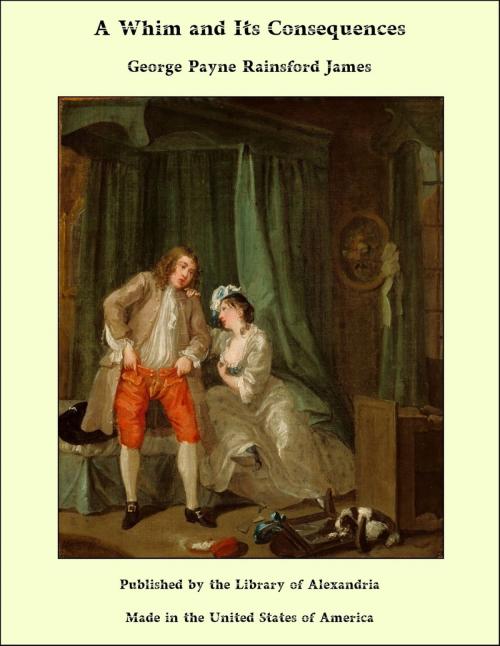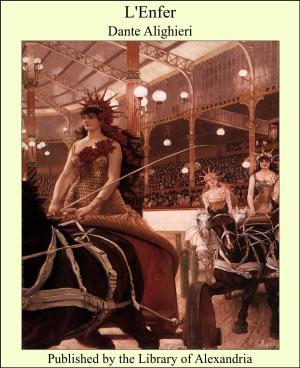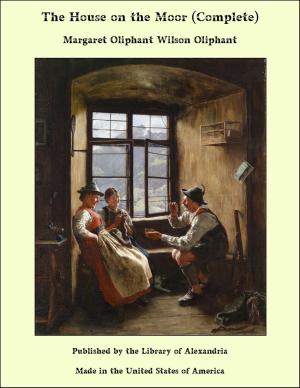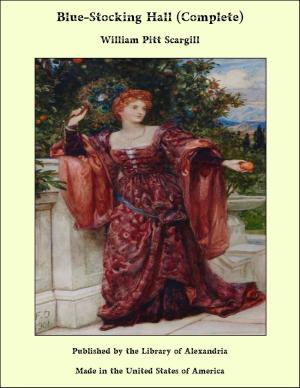A Whim and Its Consequences
Nonfiction, Religion & Spirituality, New Age, History, Fiction & Literature| Author: | George Payne Rainsford James | ISBN: | 9781465607881 |
| Publisher: | Library of Alexandria | Publication: | March 8, 2015 |
| Imprint: | Language: | English |
| Author: | George Payne Rainsford James |
| ISBN: | 9781465607881 |
| Publisher: | Library of Alexandria |
| Publication: | March 8, 2015 |
| Imprint: | |
| Language: | English |
A solitary room at midnight: a single wax candle lighted on the table: the stiff dull crimson silken curtains of the bed close drawn: half a dozen phials and two or three glasses. Is it the chamber of a sick man? He must sleep sound if it be, for there is no noise--not even a breath; and all without is as still as death. There is awe in the silence; the candle sheds gloom, not light, the damask hanging sucks up the rays, and gives nothing back: they sink into the dark wood furniture: one could hear a mouse creep over the thick carpet; but there is no sound! Is it the chamber of the dead? But where is the watcher?--Away! and what matters it here? No one will come to disturb the rest of that couch: no brawling voices, no creaking doors will make vibrate the dull cold ear of death. Watch ye the living! The dead need no watching: the sealed eyes and the clayed ears have sleep that cannot be broken. But is it the watcher who comes back again through that slowly opening door? No, that is a man; and we give all the more sad and solemn tasks of life to women. A young man, too, with the broad, free brow gathered into a sad, stern frown. He comes near the bed; he draws slowly back the curtain, and, with the faint ray of the single candle streaming in, gazes down upon the sight beneath. There it lies, the clay--animate, breathing, thoughtful, full of feelings, considerations, passions, pangs, not six-and-thirty hours before. But now so silent, so calm, so powerfully grave: it seems to seize in its very inertness upon the busy thoughts of others, and chain them down to its own deadly tranquillity. It is the corpse of a man passed the prime, not yet in the decline, of life. The hair is gray, not white; the skin somewhat wrinkled, but not shrivelled. The features are fine, but stern; and there is a deep furrow of a frown between the eyebrows, which even the pacifying hand of death has not been able to obliterate. He must have been a hard man, methinks. Yet how the living gazes on the dead! How earnestly--how tenderly! His eyes, too, fill with tears. There must have been some kindly act done, some tie of gratitude or affection between those two. It is very often that those who are stern, but just, win regard more long-enduring, deeper-seated, more intense, than the blandishing, light-minded man of sweet and hollow courtesies. The tear overtops the eyelid, and falls upon the dark shooting-jacket; and then, bending down his head, he presses his lips upon the marble brow. A drop (of the heart's dew) will be found there in the morning; for there is no warmth in that cold forehead to dry it up. The curtains are closed again; the room is once more vacant of breath. The image of human life upon the table, that decreasing taper, gutters down with droppings like those of a petrifying spring. A spark of fire, like some angry passion of the heart, floats in the melted wax above, nourishing its flaming self by wasting that it dwells in. Then comes back the watcher, with bleared and vacant eyes, and lips that smell of brandy. She has sense enough yet to stop the prodigal consumer of her only companion of the night; and sitting down, she falls asleep in the presence of death, as if she were quite familiar with the grave, and had wandered amongst the multitudes that lie beneath.
A solitary room at midnight: a single wax candle lighted on the table: the stiff dull crimson silken curtains of the bed close drawn: half a dozen phials and two or three glasses. Is it the chamber of a sick man? He must sleep sound if it be, for there is no noise--not even a breath; and all without is as still as death. There is awe in the silence; the candle sheds gloom, not light, the damask hanging sucks up the rays, and gives nothing back: they sink into the dark wood furniture: one could hear a mouse creep over the thick carpet; but there is no sound! Is it the chamber of the dead? But where is the watcher?--Away! and what matters it here? No one will come to disturb the rest of that couch: no brawling voices, no creaking doors will make vibrate the dull cold ear of death. Watch ye the living! The dead need no watching: the sealed eyes and the clayed ears have sleep that cannot be broken. But is it the watcher who comes back again through that slowly opening door? No, that is a man; and we give all the more sad and solemn tasks of life to women. A young man, too, with the broad, free brow gathered into a sad, stern frown. He comes near the bed; he draws slowly back the curtain, and, with the faint ray of the single candle streaming in, gazes down upon the sight beneath. There it lies, the clay--animate, breathing, thoughtful, full of feelings, considerations, passions, pangs, not six-and-thirty hours before. But now so silent, so calm, so powerfully grave: it seems to seize in its very inertness upon the busy thoughts of others, and chain them down to its own deadly tranquillity. It is the corpse of a man passed the prime, not yet in the decline, of life. The hair is gray, not white; the skin somewhat wrinkled, but not shrivelled. The features are fine, but stern; and there is a deep furrow of a frown between the eyebrows, which even the pacifying hand of death has not been able to obliterate. He must have been a hard man, methinks. Yet how the living gazes on the dead! How earnestly--how tenderly! His eyes, too, fill with tears. There must have been some kindly act done, some tie of gratitude or affection between those two. It is very often that those who are stern, but just, win regard more long-enduring, deeper-seated, more intense, than the blandishing, light-minded man of sweet and hollow courtesies. The tear overtops the eyelid, and falls upon the dark shooting-jacket; and then, bending down his head, he presses his lips upon the marble brow. A drop (of the heart's dew) will be found there in the morning; for there is no warmth in that cold forehead to dry it up. The curtains are closed again; the room is once more vacant of breath. The image of human life upon the table, that decreasing taper, gutters down with droppings like those of a petrifying spring. A spark of fire, like some angry passion of the heart, floats in the melted wax above, nourishing its flaming self by wasting that it dwells in. Then comes back the watcher, with bleared and vacant eyes, and lips that smell of brandy. She has sense enough yet to stop the prodigal consumer of her only companion of the night; and sitting down, she falls asleep in the presence of death, as if she were quite familiar with the grave, and had wandered amongst the multitudes that lie beneath.















